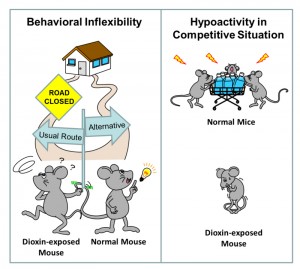Environmental Chemicals May Affect Children’s Minds Dioxin Disrupts Higher Brain Function in Mice

An increasing prevalence of mental health problems has been partly ascribed to abnormal brain development that is induced by exposure to environmental chemicals. A research group, composed of Toshihiro Endo, Masaki Kakeyama, Chiharu Tohyama, and other researchers in the Graduate School of Medicine at the University of Tokyo report that mice born to dams administered in utero a low dose of dioxin manifest executive function deficits and social behavioral abnormality.
In their study, the dioxin-exposed mice were subjected to a newly developed behavioral test that permitted an analysis of higher brain function under a group-housed condition. Exposed mice showed inflexibility in cognitive behavior and unproductive, repetitive routines, and were prone to lose out in competitive situations when living with non-exposed cage-mates. Using brains collected from the dioxin-treated mice, the behavioral abnormalities were found to be linked to imbalanced brain activity between the prefrontal cortex and amygdala, the brain regions that govern intellectual, emotional, and possibly social intelligence. This imbalance is often observed in human patients with neurodevelopmental and psychiatric disorders.
This study supports the notion that perinatal exposure to environmental chemicals could be responsible for the disruption of normal brain development and the induction of neurodevelopmental and psychiatric disorders in children. Furthermore, the newly developed test will be useful for monitoring the intervention effects of drugs, toxicants, or other experimental manipulations on mouse behavior during a long-term experiment.
Press release [PDF] (Japanese)
Paper
Toshihiro Endo, Masaki Kakeyama, Yukari Uemura, Asahi Haijima, Hiroyuki Okuno, Haruhiko Bito, Chiharu Tohyama,
“Executive Function Deficits and Social-Behavioral Abnormality in Mice Exposed to a Low Dose of Dioxin In Utero and via Lactation”,
PLOS ONE Online Edition: 2012/12/13AM7:00 (Japan time), doi: 10.1371/journal.pone.0050741.
Article link
links
Laboratory of Environmental Health Sciences, Center for Disease Biology and Integrative Medicine(Japanese)








